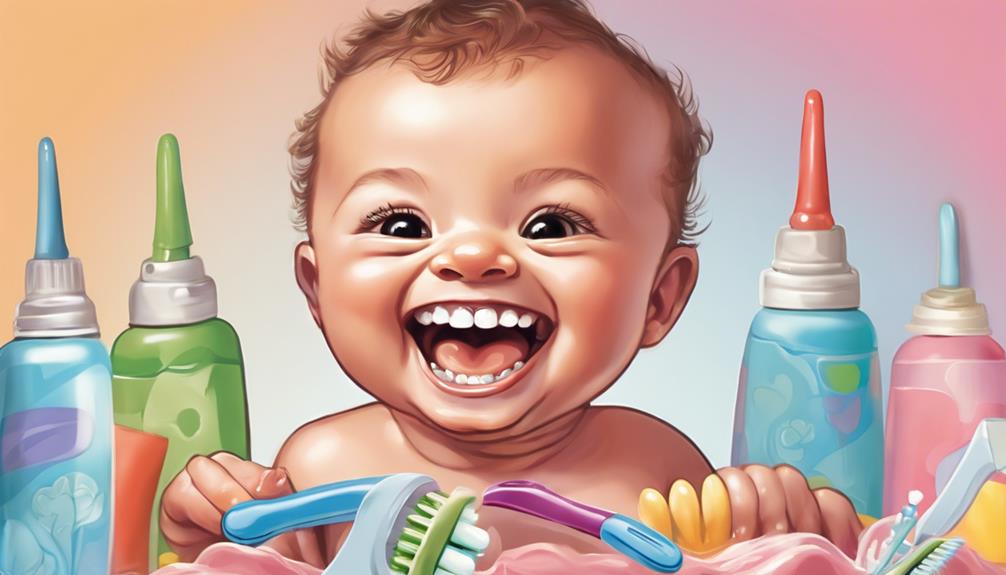No, baby teeth aren't bad for your child; in fact, they're vital for development. These primary teeth help with chewing, speaking, and guiding the adult teeth into place. If you neglect their care, your baby could face tooth decay or alignment issues, which might affect lifelong dental health. Starting good dental hygiene early is essential, as it prevents cavities and promotes healthy habits. Regular dental check-ups from the first tooth help catch potential problems early. Learn how to care for those tiny teeth and discover tips for maintaining a healthy smile as they grow.
Key Takeaways
- Baby teeth are essential for chewing, speech development, and acting as placeholders for permanent teeth, promoting proper alignment.
- Neglecting baby teeth can lead to tooth decay and misalignment, affecting the health of adult teeth.
- Early dental care is crucial, as 23% of children have cavities by age 5, which can lead to painful extractions.
- Regular brushing and good oral hygiene prevent decay and support healthy dental development from the first tooth.
Understanding Baby Teeth Development

Understanding how baby teeth develop is key to ensuring your child's dental health and well-being from an early age.
Baby teeth, also known as primary teeth, start forming before birth and typically emerge around 6 months of age. By your child's first birthday, you can expect several of these teeth to be visible. A complete set of 20 primary teeth usually appears by age 3, playing an important role in your child's oral health.
Healthy baby teeth are vital for proper chewing, speech development, and overall nutrition, which can greatly influence your child's self-esteem. However, neglecting dental care can lead to tooth decay, disrupting the eruption of permanent teeth and potentially causing misalignment later on.
To promote good dental health, begin a routine of brushing and flossing as soon as the first tooth appears. Regular check-ups with a dental specialist can help monitor your child's progress and address any concerns early.
Importance of Baby Teeth Care

Taking care of your baby's teeth is essential for their overall dental health.
Healthy baby teeth act as placeholders for permanent ones, ensuring they come in straight and strong.
Foundation for Permanent Teeth
Caring for baby teeth is essential because they act as placeholders for permanent teeth, guiding their proper alignment and spacing. If you neglect your child's baby teeth, you risk more than just cavities; you could impact their dental health for years to come.
Healthy baby teeth are vital for your child's overall well-being and development.
Here are some key reasons to prioritize baby teeth care:
- Alignment: They guarantee permanent teeth erupt in the right position.
- Speech Development: Healthy teeth aid in proper pronunciation and communication skills.
- Nutrition: They help your child chew food effectively for better digestion.
- Decay Prevention: Maintaining hygiene keeps baby teeth free from cavities and decay.
Prevention of Future Decay
Maintaining your child's baby teeth is essential not only for their current health but also for preventing future decay in their permanent teeth.
Healthy baby teeth act as placeholders, ensuring proper alignment when adult teeth emerge. If you neglect your child's teeth, you risk cavities, which affect 23% of children before age 5. This can lead to painful extractions and costly dental treatments.
Good oral hygiene is critical in caring for your child's first set of teeth. Regular brushing and flossing can notably reduce the risk of decay and help maintain healthy teeth.
Early dental check-ups are also important, as they allow you to catch any issues before they worsen. Remember, decay in baby teeth can spread to developing adult teeth, jeopardizing their health.
First Dental Visit Guidelines

You should schedule your baby's first dental visit when the first tooth comes in or by their first birthday.
Early care is essential, as it helps prevent future decay and establishes healthy habits.
Preparing for this check-up can make the experience smoother for both you and your child.
Timing for First Visit
The first dental visit should happen when your child's first tooth emerges or by their first birthday to lay the groundwork for healthy oral habits.
Early dental visits are essential for guaranteeing good oral hygiene and preventing tooth decay. If you wait too long, you may increase your child's risk of decay, which can double for each year past their first birthday.
When you take your child to a pediatric dentist, you'll benefit from their specialized training in handling children's unique dental needs. They'll also help you with the care of your child's teeth from a young age.
Here are some important points to remember:
- Establish good oral hygiene practices early on.
- Identify potential dental issues before they worsen.
- Get guidance on proper brushing and flossing techniques.
- Learn about nutrition that supports healthy permanent teeth.
Scheduling that first dental visit guarantees your child has a strong foundation for a lifetime of healthy smiles.
Don't underestimate the impact of those early appointments—they set the stage for your child's dental health journey!
Importance of Early Care
Early dental care plays an essential role in preventing future oral health issues and establishing a foundation for lifelong healthy habits. When your child's first tooth comes in, it's time for their first dental visit, ideally by their first birthday. This early dental appointment helps detect any potential issues and allows you to discuss how to care for your child's primary teeth.
Regular early dental visits can help prevent tooth decay and set the stage for healthy permanent teeth. A pediatric dentist is specially trained to address your child's unique dental needs, providing tailored advice and guidance. These visits not only help identify problems early but also allow you to establish good oral hygiene habits from a young age.
Aim for regular dental appointments every six months to promote your child's oral health. This routine encourages them to prioritize dental care throughout their lives, helping them build positive associations with visiting the dentist.
Preparing for Dental Check-up
Scheduling your child's first dental visit can set the stage for a lifetime of healthy smiles. Ideally, this visit should happen when the first tooth emerges or by your child's first birthday. Choosing a pediatric dentist guarantees your little one receives specialized care tailored to their needs. This early visit helps identify potential dental issues and teaches you about essential dental hygiene habits.
Here are some tips to prepare for the visit:
- Bring your child's favorite toy for comfort.
- Discuss the importance of healthy baby teeth with your child.
- Prepare questions about proper brushing and nutrition.
- Share any concerns regarding oral health with the dentist.
These steps promote a positive experience and foster a good relationship with dental care.
The pediatric dentist will examine your child's mouth, offer care instructions, and emphasize the significance of maintaining healthy baby teeth. Early intervention can help prevent tooth decay and support your child's ongoing dental health as they grow.
Effective Brushing Techniques

Start brushing your baby's teeth as soon as that first tooth pops up, using a soft-bristled toothbrush and a tiny amount of fluoride toothpaste. This early start helps establish good oral hygiene habits and protects those baby teeth from cavity-causing bacteria.
For children under 2, use a rice-sized amount of fluoride toothpaste, and for kids aged 3 to 6, increase it to a pea-sized amount. Encourage them to brush their teeth twice daily for at least 2 minutes each time.
While brushing, focus on cleaning both the teeth and gums gently to maintain a healthy mouth. Supervise your child until they're at least 8 years old to guarantee they're using the correct technique and not swallowing toothpaste.
Flossing should begin as soon as two teeth touch, helping to remove plaque and prevent cavities between teeth. Regular brushing not only protects against harmful bacteria but also promotes the growth of good bacteria that support oral health.
Don't forget to replace your child's toothbrush every 3-4 months or sooner if the bristles fray, guaranteeing effective cleaning and maintaining their pediatric dental health.
Role of Fluoride in Dental Health

Brushing your baby's teeth with fluoride toothpaste not only helps establish good habits but also plays an important role in strengthening their dental health. Fluoride is essential for protecting your child's teeth against tooth decay and cavities. It works by enhancing the enamel, making it more resilient to the acids produced by bacteria in the mouth.
Here are some key reasons why fluoride is critical for your child's oral health:
- Strengthens enamel: Helps create a stronger barrier against cavities.
- Prevents cavities: Regular use reduces the risk of tooth decay.
- Fluoridated water: Drinking water with fluoride supports ongoing remineralization.
- Fluoride varnish: Applications from dental professionals provide extra protection.
Incorporating fluoride toothpaste into your child's daily routine, along with consuming fluoridated water, is important for effective prevention against cavities. By prioritizing fluoride, you're setting the stage for your children's teeth to thrive as they grow, ensuring a healthier smile for years to come.
Risks of Nighttime Bottle Use

Using a bottle filled with sugary liquids at night can greatly raise your baby's risk of tooth decay.
Baby bottle tooth decay primarily affects the upper front teeth, but if sugary liquids are frequently used, other teeth can also be impacted. When your baby falls asleep with a bottle, the prolonged sugar exposure allows the sugars to linger on their teeth, considerably increasing the risk of tooth decay.
The sugars in sweetened drinks can lead to cavities, especially when they remain on teeth for an extended period during nighttime bottle use.
To help prevent sugar from lingering, it's essential to encourage your baby to finish their bottle before bedtime. Avoid filling bottles with sugar water, juice, or soft drinks, as these promote dental issues and worsen the risk of tooth decay.
Impact of Nutrition on Oral Health

Nutrition plays an essential role in shaping your baby's oral health, as a well-balanced diet fosters strong teeth and gums from the very beginning. Providing your little one with the right nutrients can greatly reduce the risk of tooth decay and cavities.
To promote ideal oral health, consider the following:
- Incorporate calcium-rich foods like yogurt and cheese for strong teeth.
- Make sure your baby gets enough vitamin D, which helps calcium absorption.
- Limit sugary snacks and beverages that contribute to tooth decay.
- Encourage hydration with fluoridated water to help maintain oral moisture.
Family Involvement in Dental Care

How can your family's participation in dental care make a difference in your child's oral health? Your active involvement is vital. By modeling good dental hygiene habits like regular brushing and flossing, you encourage your children to adopt these practices early on. Establishing a family routine that includes regular check-ups fosters their sense of responsibility for their oral health while strengthening family bonds.
Engaging your children in conversations about the importance of dental care helps them understand its significance, promoting lifelong healthy habits. You can increase their interest by allowing them to pick out their toothbrush or toothpaste flavor—this small act boosts their participation in their own dental hygiene.
Additionally, consistent family discussions about healthy food choices play an important role. Limiting sugary snacks and drinks not only improves their dental health but also reduces the risk of cavities.
Frequently Asked Questions
Is It Bad to Have Baby Teeth?
Having baby teeth isn't bad; they're essential for your child's chewing, speech development, and future dental alignment. Ensuring proper care can prevent cavities, misalignment, and promote lifelong healthy dental habits for your little one.
Is It Bad for a Baby to Be Teething?
Teething can seem painful, yet it's a natural milestone. While your baby may drool and fuss, this process is essential for their dental health. Monitor symptoms, and consult a pediatrician if concerns arise.
Can Bad Teeth Affect Your Baby?
Yes, bad teeth can affect your baby. They might experience pain, difficulty chewing, and nutritional issues. Plus, untreated cavities can lead to misalignment in permanent teeth, impacting future dental health and overall well-being. It’s important to monitor your baby’s dental health and address any issues early on. Look out for baby teething signs, such as excessive drooling, irritability, and swollen or red gums. If you notice any concerning symptoms, it’s best to consult a pediatric dentist for proper evaluation and treatment. Early intervention can help prevent long-term complications and ensure your baby’s dental health and overall well-being.
What Happens if a Baby's Tooth Cavity Is Left Untreated?
If you leave a baby's tooth cavity untreated, it can cause pain, disrupt chewing, misalign future teeth, lead to infections, and hinder speech development. Early dental care is vital to prevent these long-term issues.
Can Babies Experience Dental Issues If Born With Teeth?
Yes, it is possible for a baby born with teeth to experience dental issues. This condition, known as natal teeth, can lead to issues with breastfeeding, tongue irritation, and potential risks of choking. It is important for parents to consult with a pediatric dentist to address any potential dental concerns.
Conclusion
As you watch your little one's first teeth emerge, remember that each tiny tooth plays an essential role in their development.
By prioritizing care and establishing good habits early on, you're setting the stage for a bright, healthy smile.
Imagine the joy of their radiant grin as they grow!
Don't wait until it's too late—take charge of their dental journey today, and enjoy the peace of mind that comes with nurturing their precious teeth from the start.









